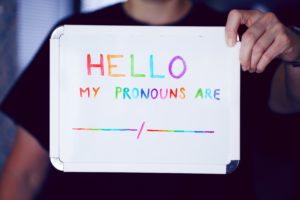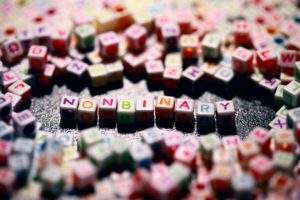Pronouns: he/they

From a very young age I was aware that the way I wanted to express myself didn’t really fit in with what I believed “being a boy” meant. I found myself drawn to stereotypically feminine toys as a child, and during dress-up at preschool I would usually be more interested in the princess outfits and tutus than the “masculine” offerings. It was always something that interested me, and I definitely enjoyed it. It wasn’t until my dad made a negative comment whilst I was wearing a family friend’s dress as a child that I started to associate my desire to look and be feminine with being bad and wrong. I didn’t know that it was ok to express yourself authentically. This led me to repress this very innate and important part of myself for a long time – resulting in anxiety, depression, and difficulty expressing emotion.
The feeling that I didn’t fit in intensified by the time I hit puberty and started experiencing attraction towards others. Although I was attracted to women like the overwhelming majority of my peers, I also found that my attraction wasn’t exclusively towards women. At the time, I thought that this meant that I had to be bisexual. My understanding of sexuality was quite basic at the time. I thought you were either gay, straight, or bi. I didn’t know that other people experienced sexuality in many different ways, and I also didn’t know that your gender could exist outside the binary. It was very rarely discussed in the media I consumed, and it certainly wasn’t mentioned at my school, where whenever we were taught about relationships it was always from a heterosexual perspective.
The fact that queer people weren’t even mentioned in these conversations reinforced the feelings I had of being weird and abnormal. It was something that caused a huge amount of anxiety for me, but at the same time I felt that it wasn’t something I could seek help for, because at the time in my mind I didn’t see my concerns as being legitimate.
I also didn’t really resonate with the lessons I had about mental health. We had a few basic lessons on the topic, but there was a lack of frankness and openness. I think there was a lot of stigma surrounding it whilst I was at school, and I didn’t know that the anxiousness that I was experiencing not only wasn’t my fault, but also that other people were going through it too.
By the time I was 16 I ended up with a really good group of friends, one of whom came out as bisexual. Everyone in our group accepted her, and she explained to me that gender and sexuality are far more nuanced than I thought. This comforted me, and although I still had a lot of negative feelings around my gender and sexuality, I now see this as a turning point in my self acceptance. Around a year later, I came out as bisexual to my parents, and shortly after I started getting therapy.

Although I found discussing my sexuality in a therapeutic setting to be useful, I still wasn’t ready to discuss my gender during these sessions. It was still something which was repressed and at the time I couldn’t fully articulate it to myself – let alone anyone else.
As I’ve got to know myself a lot better, I now realise that I’m not attracted to a specific gender, but a more loosely defined set of both physical and personal traits which people of all genders can and do possess. As a result, I now feel that the term pansexual most accurately describes my sexuality. This revelation came first, and several years after I realised that I was non-binary.
Although it took me a long time to realise, I now love the fact that I am queer. Our differences are what make us interesting and unique, and I don’t have any interest in adhering to outdated rules about how we should dress and act based on the gender we were assigned at birth. I have also met many amazing people who identify in similar ways to myself, and I now really enjoy sharing my perspectives on gender and sexuality with other like-minded people. For me, I have found honest discussion to be the best way to alleviate my anxiety. Despite the difficulties I faced growing up, I no longer feel ashamed to be myself. Unapologetically authentic expression is not only powerful, but it is beautiful.
If you would like to write a blog featuring your experiences, please read our submission guidelines here, and get in touch via communications@stem4.org.uk.


